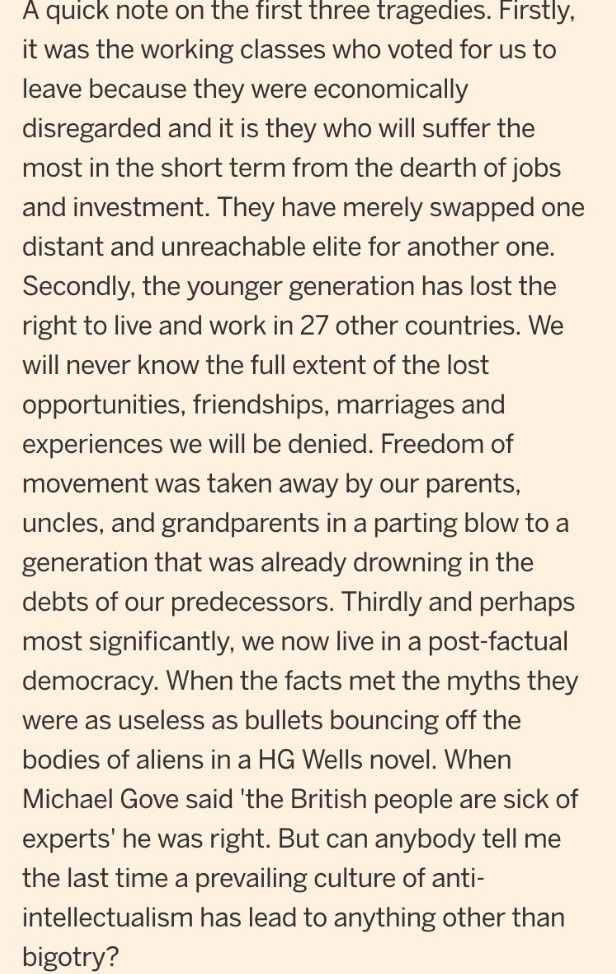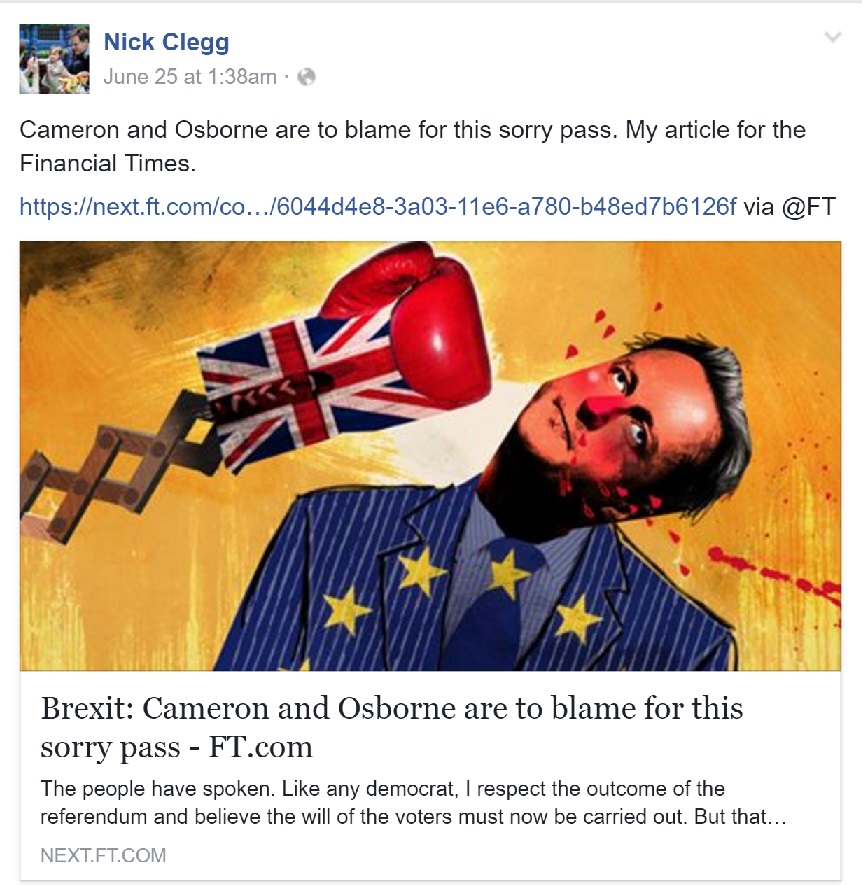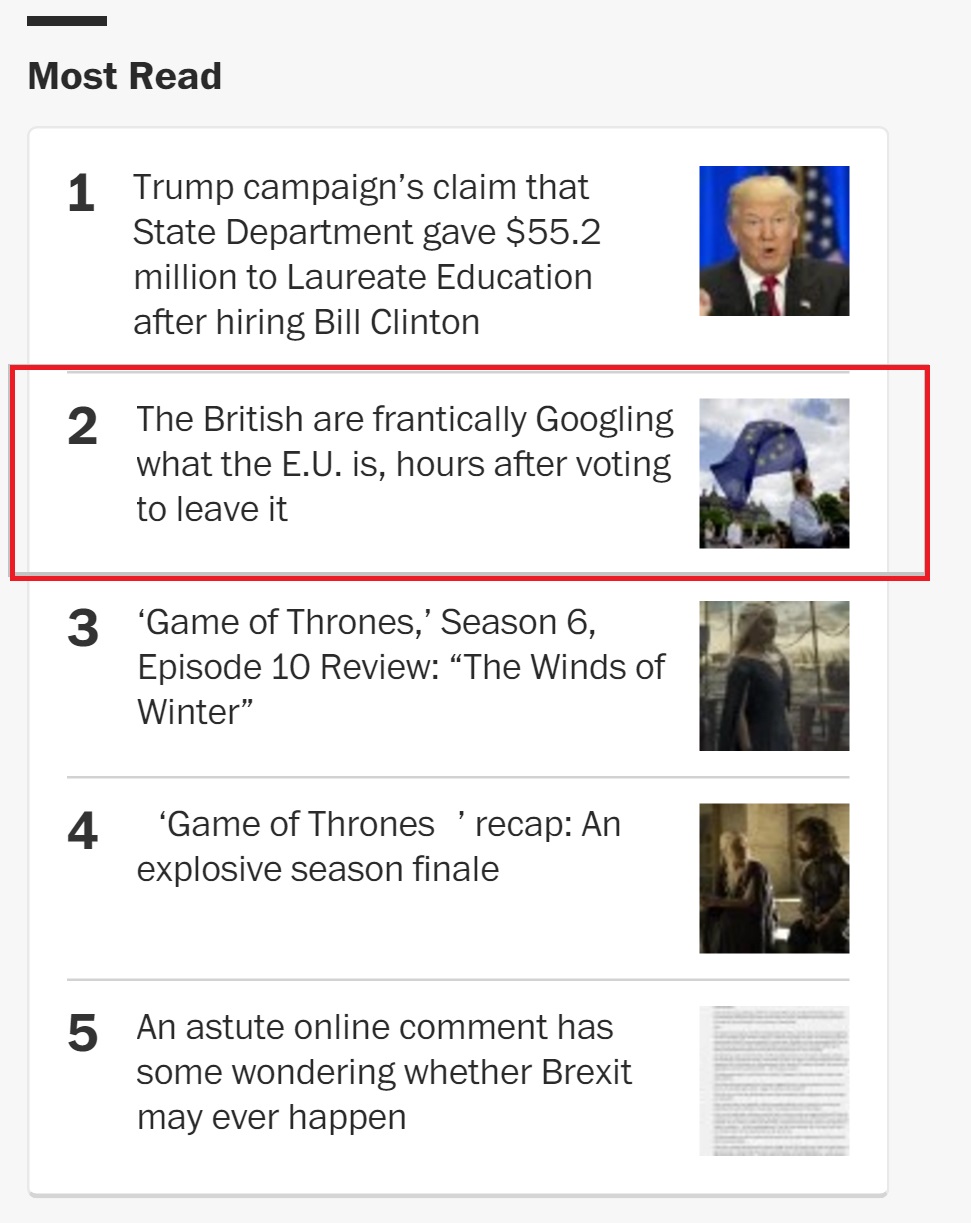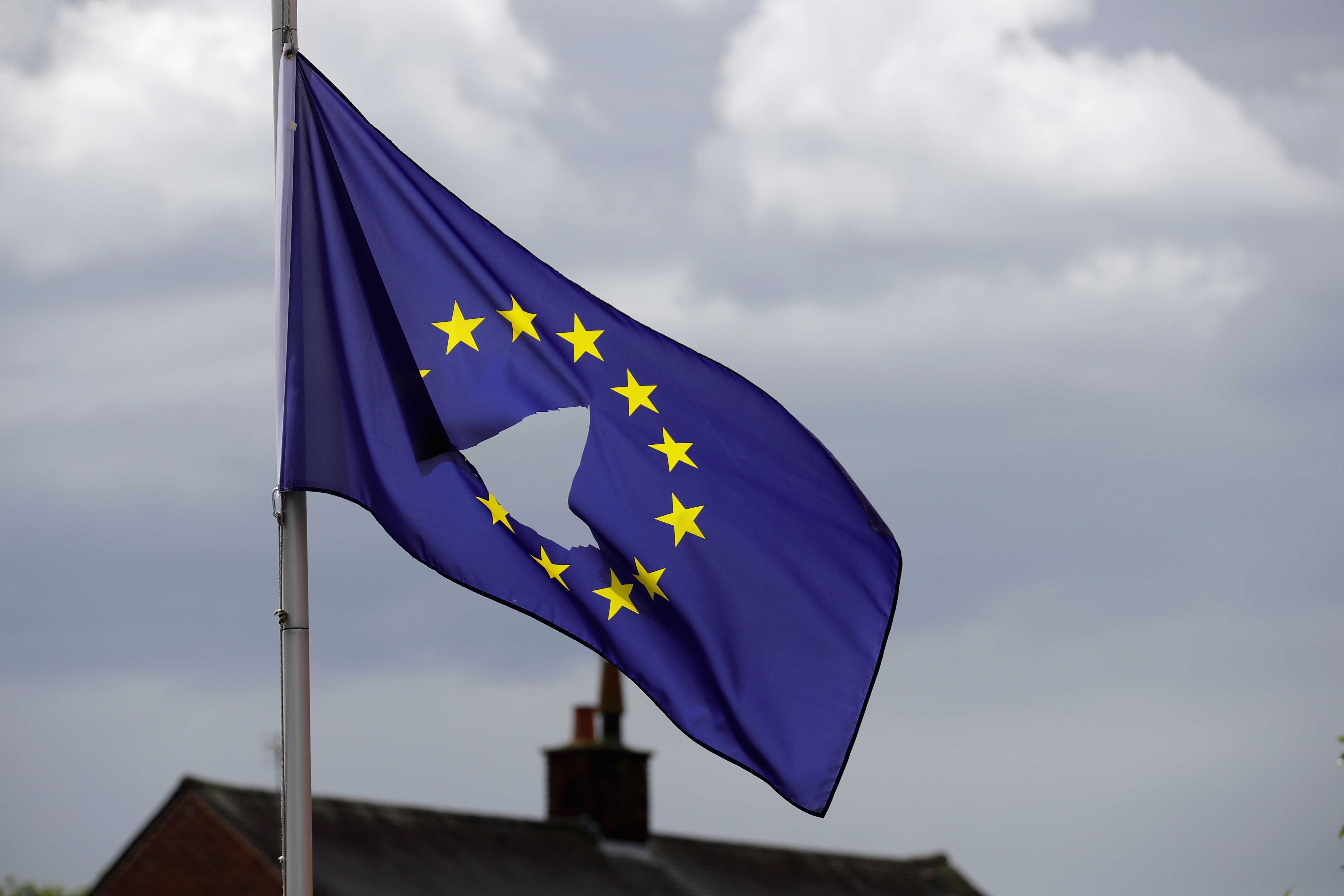From the Brits first:
1. Commentary from its best politician in a generation
Tony Blair: "Brexit's Stunning Coup", New York Times, June 24.
Blair was the Prime Minister of the UK between 1997 and 2007, and won three successive elections for his Labour party.
TL;DR:
- The Conservatives' loss of the middle ground "political center": It has lost its power to persuade, and the people it seeks to represent.
- A convergence of the far left and far right to offer simplistic and misleading populist answers to complex problems: This convergence means that the right attacks immigrants while the left rails at bankers, with both extremes offering rebel-rousing and agitating answers to complex problems caused by globalisation.
- Conclusion: The political centre must regain its political traction, rediscover its capacity to analyse the problems we all face and find solutions that rise above the populist anger.
2. An opinion from a young British voter
Rhiannon Lucy Cosslett, a freelance journalist in her late 20s: "If you’re young and angry about the EU referendum, you’re right to be", The Guardian
A few parents asking if my young ppl Brexit piece is in the paper. Don't think so but you can direct your kids here https://t.co/UM8nVdvNVJ
— Rhiannon L Cosslett (@rhiannonlucyc) June 25, 2016
TL;DR:
- A majority of young people voted to remain: Three-quarters of young people – a massive mandate – are said to have voted remain, according to a YouGov poll.
- Highlighted two statements from elsewhere that described how young British felt:
1) "I'm so angry... A generation given everything: free education, golden pensions, social mobility, have voted to strip my generation’s future.”
2) A comment on Financial Times website that has been widely shared: “The younger generation has lost the right to live and work in 27 other countries. We will never know the full extent of lost opportunities, friendships, marriages and experiences we will be denied. Freedom of movement was taken away by our parents, uncles and grandparents in a parting blow to a generation that was already drowning in the debts of its predecessors.”
 Source: The Financial Times
Source: The Financial Times
- Conclusion: "Yes, as a demographic, we have lost, but at the same time we have made a powerful statement about the kind of country we want to live in. That we are to be deprived of it is a crying shame, but at least we know that we are part of a collective of people who want a better world".
3. Commentary from a key member of the first Cameron coalition government who had seen it all.
Nick Clegg: "Brexit: Cameron and Osborne are to blame for this sorry pass", Financial Times, June 24.
Clegg was the former leader of the Liberal Democrats and the deputy prime minister in the 2010-15 coalition government.
 Source: Nick Clegg Facebook
Source: Nick Clegg Facebook
TL;DR:
- National interest was hijacked by internal party feuds in the Conservative government: When Clegg was in government, he was repeatedly asked by the Conservatives to agree to a referendum on their terms. He refused because the UK had enshrined into law in 2011 a referendum trigger to ratify future EU Treaties.
- The current government's over-confidence in their ability to persuade the public: The Conservatives' complacency increased when they unexpectedly won the general election last year, and when they were on the winning side of the Scottish referendum in 2014. They forgot that less than a quarter of eligible voters voted Conservative — it was a vote against all the other likely alternatives.
- Conclusion: Internationalist, pro-European politicians in all parties must never again allow their national interests to be hijacked by internal party feuds.
4. Commentary from a British journalist who focuses on economics.
Martin Wolf, "Brexit will reconfigure the UK economy", Financial Times, June 24.
TL;DR:
- The UK economy will be reconfigured: "Those businesses that have set up in the UK to serve the EU market must reconsider their position. The City’s role in trading in euro-denominated assets will be undermined. Manufacturers will also have to consider how to readjust their productive capacity. Many will relocate. Businesses who depend on their ability to employ European nationals freely will have to reshape operations. Many will want to move inside the EU single market. Such decisions will not have to be made at once. But they will drive down investment now."
- Conclusion: "The UK’s decision to join the EU was taken for sound reasons. Its decision to leave was not. It is a choice to turn its back on the great effort to heal Europe’s historical divisions. This is, for me, among the saddest of hours."
----------------------------
From outside kaypohs:
5. Commentary from a Harvard academic who suggested a better way to conduct the referendum
Kenneth Rogoff, "Britain’s Democratic Failure", Project Syndicate, June 24.
TL;DR:
- The bar to decide on an EU exit is way too low: The real lunacy of the United Kingdom’s vote to leave the European Union "was the absurdly low bar for exit, requiring only a simple majority. Given voter turnout of 70 per cent, this meant that the leave campaign won with only 36% of eligible voters backing it."
- More checks and balances are needed for democratic systems: Modern democracies have evolved systems of checks and balances to protect the interests of minorities and to avoid making uninformed decisions with catastrophic consequences. The greater and more lasting the decision, the higher the hurdles.
- Conclusion: The current international norm of simple majority rule is "a formula for chaos".
6. Representative from Singapore
Tharman Shanmugaratnam, "Divided We Leave", Facebook, June 24.
TL;DR:
- The more profound questions revolve around politics: Many of the people who voted for Britain to leave Europe, like those in England’s industrial cities, may end up being hurt by its economic consequences. Yet their frustration over their jobs and wages, and their fear of uncontrolled immigration if Britain stayed in Europe, has shaped their votes.
- "New brew" in politics globally, especially mature democracies: There is a growing appeal of nationalist politics, demagogues, and in some cases outright racism. Moreover, there is a growing disaffection with the establishment and a weakening of trust and consensus in society, and of the centre in politics.
- Agrees with Blair: As politics gets fragmented, the political extremes will gain appeal. To tackle it, the politics of the centre must stay connected to the challenges that ordinary people face — address their need for jobs and security, for one, and find a balance in immigration that preserves a sense of identity.
7. No particular reason other than the fact that it went viral on social media
Brian Fung, "The British are frantically Googling what the E.U. is, hours after voting to leave it", The Washington Post, June 24.
 Source: The Washington Post
Source: The Washington Post
TL;DR:
- Errr... Okay: Google reported sharp upticks in searches not only related to the ballot measure but also about basic questions concerning the implications of the vote.
In other words, many voters had no idea how important the vote was — worse still, maybe didn't realise what they had voted for.
- Conclusion: Despite the attempts by either side to court voters, "Britons were not only mystified by what would happen if they left the EU — many seemed not to even know what the European Union is".
8. Article to educate the British if they are having second thoughts
Gabriel Roth:"Brexit May Well Never Happen", Slate, June 25.
- Formal withdrawal has not started yet and it takes 2 years: UK's withdrawal from the EU can’t happen until it sends the EU an “Article 50 notification,” a formal announcement that it intends to withdraw. That notification starts a two-year countdown during which Britain and Europe negotiate the terms of their separation. At the end of two years, regardless of the state of those negotiations, Britain’s out.
- Time heals all pain — probability of leaving reduces if it takes a while: The more time that passes before the Article 50 notification is sent, the less likely it is to happen. For instance, it will take a while for the new PM to be elected and the PM can announce a blue-ribbon commission to deliver a report. It can even call for a vote in Parliament or to use the topic as a GE issue.
Photo by Christopher Furlong/Getty Images.
If you like what you read, follow us on Facebook and Twitter to get the latest updates.
If you like what you read, follow us on Facebook, Instagram, Twitter and Telegram to get the latest updates.
